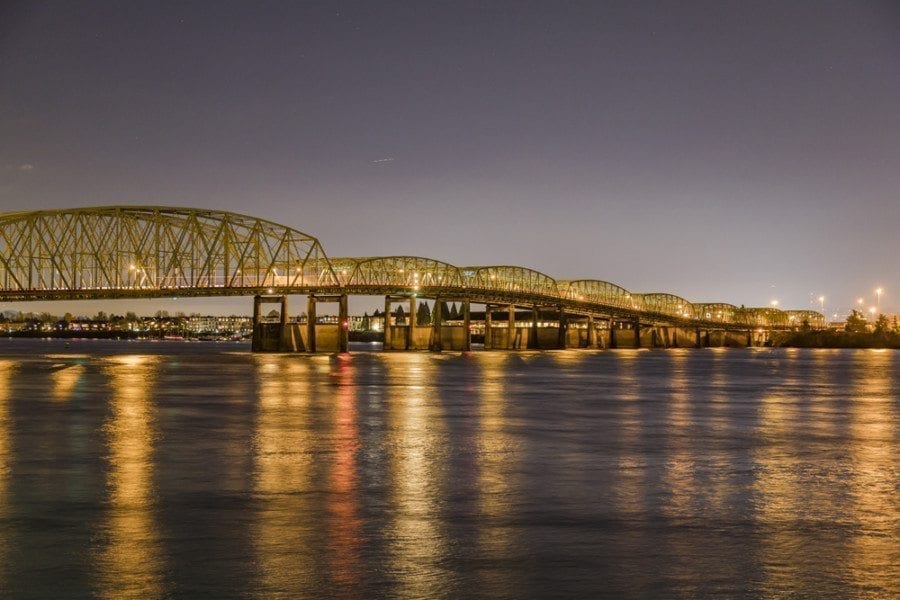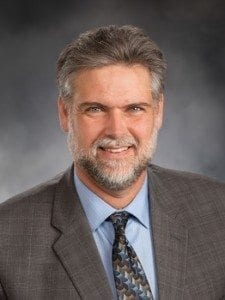The movement to create a new project to construct a replacement for the Interstate 5 (I-5) bridge has gathered momentum in recent weeks despite the continued objections of some area and regional elected officials.
Senate Bill 5806 (SB 5806) has been passed by lawmakers in the Washington State Senate after its companion in the House of Representatives, House Bill 2095 (HB 2095), had previously been passed by a floor vote.
In addition to that, the Clark County Board of Councilors passed a resolution on March 8 in support of SB 5806. That came one day after the Southwest Washington Regional Transportation Council (RTC) passed its own resolution in support of the legislative bills. The city of Vancouver, city of Battle Ground and Port of Vancouver have also passed similar resolutions.

Sens. Annette Cleveland (D-49th District), Ann Rivers (R-18th District) and Lynda Wilson (R-17th District) are the local lawmakers who are among the co-sponsors of SB 5806. Reps. Paul Harris (R-17th District), Monica Stonier (D-49th District), Brandon Vick (R-18th District) and Sharon Wylie (D-49th District) are the local legislators who are among the co-sponsors of the companion HB 2095, which made it out of the House Transportation Committee in spite of the efforts of Rep. Ed Orcutt (R-20th District)

“I’ve read through it (HB 2095) and I have read through SB 5806,’’ said Orcutt, the ranking Republican on the House Transportation Committee and a representative since 2002. “I don’t see anything in there that talks about a third bridge (over the Columbia River). Quite frankly, we’re going to do a huge disservice to the citizens of Clark County if our only bite at the apple is replacing the I-5 bridge and not expanding access across the river.’’
Orcutt finds it to almost unbelievable that in Cowlitz County, where he resides as a resident of Kalama, there are currently five crossings across the Cowlitz River with a total of eight lanes in each direction. By comparison, Clark County has just two crossings (seven lanes total) over the Columbia River despite the fact that Portland and Vancouver combined have a population (2.4 million, 2010 census) more than 20 times greater than Cowlitz County (102,410, 2010 census).
“You have 20 times the population and 12 percent fewer lanes,’’ Orcutt pointed out. “The math just doesn’t work.’’
Orcutt referred to the failed Columbia River Crossing (CRC) as a “monstrosity.’’ Like many opponents of the movement for an I-5 bridge replacement, he sees the latest efforts as a continuation of the CRC.
“There may be an opportunity to do something other than the CRC, but these bills don’t allow us to do anything other than replace the I-5 crossing,’’ Orcutt said. “I’m concerned that some of the people giving testimony say the CRC is ‘shovel ready’ and that there are too many people down there who want to just resurrect the CRC and that just doesn’t work. That’s not good enough and it doesn’t solve the congestion problem.’’
Orcutt doesn’t disagree with those who say the I-5 bridge will eventually need to be replaced. He’s just adamant that it isn’t the only solution to Clark County’s transportation congestion issues.
“I don’t have a problem doing something to replace the I-5 bridge,’’ Orcutt said. “It is clearly becoming functionally obsolete. The alignment is bad. The lanes are narrow. Vehicles from Highway 14 don’t have room to merge onto I-5. There are good reasons to replace that bridge, but let’s not kid ourselves. It doesn’t get us any congestion relief. They (proponents of the I-5 bridge replacement) keep talking about how Clark County is growing but at the same time they want to put off doing something about the congestion relief. It just seems that more and more of an argument can be made that we need an additional crossing.’’
Orcutt doesn’t subscribe to the theory that Clark County will only get one bite at the apple when it comes to a solution to its transportation congestion problems.
“This is the testimony that’s been given by a lot of people in Clark County,’’ he said. “They say we get one bite at the apple, that the next time we do a major road project we’re going to get one project and not two. If that’s the case, we need to be looking at if there is a way to bring down the cost of an I-5 bridge replacement and find them money to do a third crossing. If we don’t do that, we do a huge disservice to the folks of Clark County.’’
Orcutt supported House Bill 1222 (HB 1222), authored by Rep. Liz Pike (R-18th District) and also supported by Rep. Vicki Kraft (R-17th District). Pike’s bill would have established a bi-state coalition to examine potential solutions to the transportation congestion issues. However, HB 1222 didn’t make it out of the House Transportation Committee.
“I think the only hope now, because Liz’s bill failed, it could be revived and I think that would be the best approach to use, but the only other approach would be to try to get something into the budget,’’ Orcutt said. “But, the same people making the decision to run with Cleveland’s bill over Pike’s bill are the same ones who are passing the budget. I’m involved in the budget process but if I’m getting outvoted on the floor on the bills, I’m going to get outvoted on the amendments to the budget as well.’’
Ultimately, it appears this latest effort to replace the I-5 bridge will come down to whether or not Oregon and Washington lawmakers will approve funding when the proposal becomes an actual project.
“You can’t have a project without funding,’’ Orcutt said. “If this goes through the way it is and we’re not able to do anything else in the budget and we’re not able to resurrect Liz’s bill, hopefully we will get a project people can support and the delegation can get behind. I’m not feeling very good about that now.’’
The bottom line, Orcutt says, will be what kind of a project is moved forward, including the price tag, which will be impacted by whether or not light rail is attached.
“There’s definitely going to be a battle on that,’’ Orcutt said, referring to light rail. “I’m sure there are proponents of this bill who are still going to push for light rail. But, what we need is more lanes crossing the river. You won’t relieve congestion without more crossings. No matter how many lanes you add to the I-5 bridge, you’re not going to change the congestion problems because I’m not convinced Oregon is ready to adequately take care of the problems at the Rose Quarter. Until I see the Oregon legislature pass a package to deal with that, I’m not convinced it’s going to happen.’’
Orcutt said he recently received a package from the RTC that proposed $400-450 million worth of improvements at the Rose Quarter.
“To fix the whole Rose Quarter issue with $400-450 million, I would be amazed if they could do it with that,’’ he said.
Kraft, Pike keep fighting
Like Orcutt, both Pike and Kraft continue to support other traffic congestion solutions while opposing HB 2095.
“I’m grateful to the 37 other Republicans who stood with Rep. Ed Orcutt, Rep. Vicki Caldwell Kraft and I to reject this rear view, reactionary plan,’’ said Pike, after HB 2095 passed with a vote of 60-38 on the House floor. “I stood on the House floor today to explain the difference between visionary solutions and reactionary solutions.’’
Kraft also testified on the floor prior to the vote.
“I just spoke on the House floor to respectfully ask for a ‘No’ on bill HB 2095 – the I-5 Columbia River bill,’’ Kraft said. “If the main objective is to reduce traffic congestion that means we need additional capacity which is a 3rd bridge, not replacement of the I-5 bridge which will leave us with only two bridges – still – and with no real congestion improvement.
“If we are trying to enhance safety of existing bridges then replacing the I-5 bridge as a next step makes sense,’’ Kraft said. “However, citizens are telling me they are tired of sitting in traffic and want me to solve this problem. The best way to do this is adding another bridge.’’
Stewart, Quiring raise objections
Clark County Councilors Jeanne Stewart and Eileen Quiring also took advantage of opportunities to voice their concerns over support of the companion I-5 bridge replacement bills.
Prior to the RTC vote in support of the I-5 bridge replacement legislation, Stewart spoke out against the likelihood of tolls on a new bridge.
“It indicates a project of statewide significance means a border crossing that involves both private and public investment carried out in conjunction with adjacent states or provinces,’’ said Stewart, who currently serves as chair of the RTC. “I’m very concerned about the requirement because it says it will include private and when I hear private I’m very uncomfortable because that means tolls and there’s no doubt in my mind people at this table who believe tolls are a foregone conclusion. You can’t avoid them. They will be there.
“I resist the idea of tolls because the people who will be hurt the most by them will be the people who live in Clark County and need to commute to Oregon,’’ Stewart said. “That is in my book and unfair burden.’’
Stewart and Quiring both voted against the Board of County Councilors’ endorsement of the legislation, but that resolution passed 3-2 due to supporting votes from Marc Boldt, John Blom and Julie Olson. Quiring also voted against the RTC resolution.
“We already have spent a great deal of money studying this particular replacement project; it’s not like money hasn’t been spent planning it,’’ Quiring said at the March 7 RTC meeting. “I’m not for replacing the bridge at this time. We have to address the (I-5) corridor but I think we can also look at other avenues of getting over the Columbia River while this waits for repairs in the future. I think it would be devastating to be working on the I-5 bridge and not have somewhere else for individuals to go, and freight, across the river.’’




